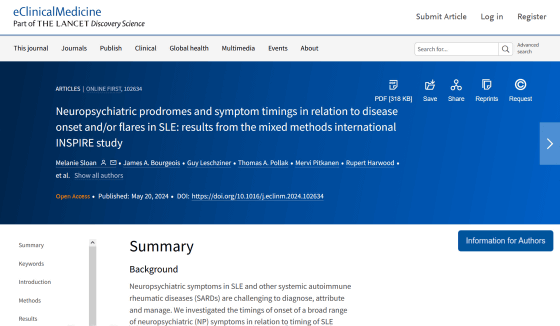Research reveals that 'nightmares' and 'daydreams' may be early signs of autoimmune disease

Research has shown that
Neuropsychiatric prodromes and symptom timing in relation to disease onset and/or flares in SLE: results from the mixed methods international INSPIRE study - eClinicalMedicine
https://www.thelancet.com/journals/eclinm/article/PIIS2589-5370(24)00213-X/fulltext

'I feel like I'm Alice in Wonderland': nightmares and 'daymares' could be early warning signs of autoimmune disease | University of Cambridge
https://www.cam.ac.uk/research/news/i-feel-like-im-alice-in-wonderland-nightmares-and-daymares-could-be-early-warning-signs-of
Nightmares May Have an Eerie Link to Autoimmune Disease: ScienceAlert
https://www.sciencealert.com/nightmares-may-have-an-eerie-link-to-autoimmune-disease
Systemic lupus erythematosus is an autoimmune disease characterized by symptoms such as fever, fatigue, a red rash on both cheeks (butterfly rash), and arthritis, which come and go every few years. In addition to these symptoms, symptoms may appear in other organs such as the cardiovascular system, brain, and kidneys, and in severe cases may be life-threatening. Most cases develop between the ages of 15 and 45, and recurrences of symptoms are called 'flare-ups.'
A research team led by Dr. Melanie Sloane , a public health scientist at the University of Cambridge, conducted an online survey of 676 patients with lupus, asking them about the timing of 29 neurological and mental health symptoms (such as depression, hallucinations, and loss of balance) and the order in which symptoms appear during lupus flare-ups.
The analysis showed that about three-fifths of patients with systemic lupus erythematosus experienced sleep disturbances due to 'nightmares,' and about one-third of them began having nightmares more than a year before the onset or flare-up of systemic lupus erythematosus. These results suggest that dreams and the brain's immune system are somehow related.

In addition to the online survey, the team also conducted in-depth interviews with 69 patients with autoimmune rheumatic diseases, including systemic lupus erythematosus. One patient described her nightmares as 'horrifying, like murders, like skin peeling off people... I felt overwhelmed, like when my lupus is in a flare... I think the more stress my body is under, the more vivid and bad my dreams become.'
Patients who experienced hallucinations tended to be reluctant to talk about them, but when interviewers used the word 'daymare' instead of hallucination, they were more willing to talk about their experiences. One patient said, 'When I heard the word 'daymare,' it immediately made sense. It's not necessarily scary, it's like I'm dreaming but my eyes are open and I'm sitting in a garden. I'm awake but I don't remember the dream, I'm there but I'm not... it's a really disoriented feeling. The closest I can get to it is feeling like I'm Alice in Wonderland.'
The research team also interviewed 40 clinicians, as well as patients, and found that many of the clinicians had never considered the possibility of a link between lupus flare-ups and nightmares or daydreams. Many of the clinicians said they would be willing to discuss these issues with their patients in the future if there was a link.

'It is important that clinicians take the time to talk to their patients about these symptoms and to document their individual symptom progression,' says Dr Sloan. 'While patients often know what symptoms are warning signs of a flare-up, patients and doctors may be reluctant to discuss psychiatric or neurological symptoms, especially if they don't understand that these are part of an autoimmune disease.'
Professor David Cruz , from King's College London and lead author of the paper, said: 'I have discussed nightmares with patients with systemic lupus erythematosus and have suggested there may be a link between disease activity and nightmares. We urge more doctors to ask their patients about nightmares and other neuropsychiatric symptoms. Nightmares and other neuropsychiatric symptoms are thought to be uncommon but are actually very common in systemic autoimmune diseases. Asking about nightmares and daydreams can help detect flare-ups early.'
Related Posts:
in Science, , Posted by log1h_ik







